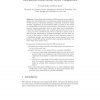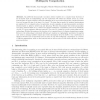31 search results - page 1 / 7 » On the Hardness of Information-Theoretic Multiparty Computat... |
EUROCRYPT
2004
Springer
13 years 10 months ago
2004
Springer
We revisit the following open problem in information-theoretic cryptography: Does the communication complexity of unconditionally secure computation depend on the computational com...
SACRYPT
2009
Springer
13 years 11 months ago
2009
Springer
We re-visit the problem of secure multiparty set intersection in information theoretic settings. In [16], Li et.al have proposed a protocol for multiparty set intersection problem...
CRYPTO
2000
Springer
13 years 9 months ago
2000
Springer
Secure Function Evaluation (SFE) protocols are very hard to design, and reducibility has been recognized as a highly desirable property of SFE protocols. Informally speaking, reduc...
GRC
2008
IEEE
13 years 5 months ago
2008
IEEE
—Secure multiparty computation is a very important research topic in cryptography. A secure multi-party computation involves N untrusful parties. It takes input xi from the ith p...
EUROCRYPT
2011
Springer
12 years 8 months ago
2011
Springer
An additively-homomorphic encryption scheme enables us to compute linear functions of an encrypted input by manipulating only the ciphertexts. We define the relaxed notion of a se...


